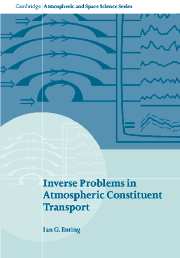Book contents
- Frontmatter
- Contents
- Preface
- Part A Principles
- Chapter 1 Introduction
- Chapter 2 Atmospheric transport and transport models
- Chapter 3 Estimation
- Chapter 4 Time-series estimation
- Chapter 5 Observations of atmospheric composition
- Chapter 6 The sources and sinks
- Chapter 7 Problem formulation
- Chapter 8 Ill-conditioning
- Chapter 9 Analysis of model error
- Chapter 10 Green's functions and synthesis inversion
- Chapter 11 Time-stepping inversions
- Chapter 12 Non-linear inversion techniques
- Chapter 13 Experimental design
- Part B Recent applications
- Appendices
- Solutions to exercises
- References
- Index
Chapter 9 - Analysis of model error
Published online by Cambridge University Press: 05 November 2009
- Frontmatter
- Contents
- Preface
- Part A Principles
- Chapter 1 Introduction
- Chapter 2 Atmospheric transport and transport models
- Chapter 3 Estimation
- Chapter 4 Time-series estimation
- Chapter 5 Observations of atmospheric composition
- Chapter 6 The sources and sinks
- Chapter 7 Problem formulation
- Chapter 8 Ill-conditioning
- Chapter 9 Analysis of model error
- Chapter 10 Green's functions and synthesis inversion
- Chapter 11 Time-stepping inversions
- Chapter 12 Non-linear inversion techniques
- Chapter 13 Experimental design
- Part B Recent applications
- Appendices
- Solutions to exercises
- References
- Index
Summary
“Therefore you don't have a single answer to your questions?”
“Adso, if I did I would teach theology in Paris.”
“In Paris, do they always have the true answer?”
“Never”, William said, “but they are very sure of their errors.”
Umberto Eco: The Name of the Rose (Trans. W. Weaver).Model error
The effect of the ill-conditioning described in the previous chapter is to amplify errors both in the observations and in the models. This makes consideration of such errors a particularly important part of the analysis. Observational error has been discussed in Chapter 5. This chapter addresses the issue of ‘model error’.
The main contributions to model error are the following.
▪ Errors in the atmospheric-transport model. This is the main topic of Section 9.2. The use of tracers to calibrate transport (Chapter 18) can also help characterise transport-model error.
▪ Errors associated with discretisation of the source. This is discussed in Section 8.3.
▪ Mis-match in spatial and temporal scales between models and observations, as discussed in Section 9.3.
▪ Errors in the statistical model. These are discussed in Section 9.4
To discuss model error, we adopt a general formalism from Tarantola, using pmodel(m|x) to represent the probability (density) of the ‘true’ output being m given an input x. For an exact deterministic relation, m = G(x), this density becomes a deltafunction, i.e. it is zero unless the deterministic relation holds. The more general case with non-zero probability density form m ≠ G(x) allows for the possibility of error in the deterministic ‘model’, G(x). There may also be scope for characterising some aspects of ‘model error’ in terms of the prior distribution of model parameters as described by pprior(x).
- Type
- Chapter
- Information
- Inverse Problems in Atmospheric Constituent Transport , pp. 150 - 162Publisher: Cambridge University PressPrint publication year: 2002



